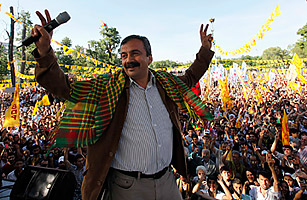
Sirri Sureyya Onder is neither a Kurd nor a politician. Yet, when the popular filmmaker and writer was approached by Turkey’s Kurdish party to run for an Istanbul parliamentary seat in Sunday’s elections, he felt he could not refuse. “This parliament has an opportunity to make history,” he said, between campaign stops at coffeehouses in Zeytinburnu, a working-class district near Istanbul’s airport populated by Kurds who migrated here over the past three decades years to flee fighting in the southeast. “It will be tasked with drafting a new constitution which could finally secure democratic rights and freedoms for everyone. For the first time, I feel as if I can make a difference.”
With the Arab Spring having reached its doorstep in neighbouring Syria, Turkey may finally have run out of time to defer addressing the grievances of its restive Kurdish population, estimated at around 14 million. For years Ankara denied the Kurds existed — they were called mountain Turks — and banned the Kurdish language from being spoken. In 1984, the PKK took up arms in a fight for Kurdish independence, and some 45,000 people have been killed in the ensuing conflict. But Prime Minister Recep Tayyip Erdogan, who took power in 2002, vowed to seek a political solution to the conflict, declaring in a historic speech that “the Kurdish problem is my problem”. Erdogan acknowledged that the government had mismanaged relations with the Kurdish population, and promised greater democracy.